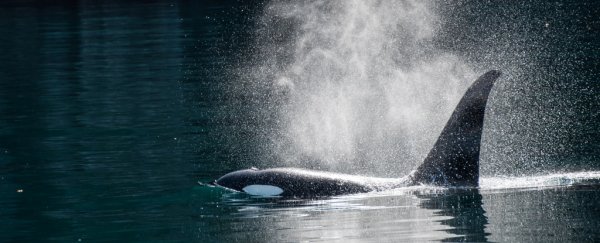It's something most of us can only ever dream of. You're swimming in the ocean, minding your own business, when suddenly a family of sleek marine mammals materialises, joining you as you glide through the water.
That's what happened to not one, but two swimmers off the coast of New Zealand in recent weeks, as they were joined in the water by families of cavorting orcas (Orcinus orca).
A video currently in the process of going viral was shot by photographer Dylan Brayshaw at Hahei Beach on December 4. He describes seeing a swimmer heading towards a group of three orcas, which began to swim around her.
She got out of the water to collect herself, and when she returned, Brayshaw started filming. The video is absolutely breathtaking - a small family of orcas, including two juveniles, weaving around the swimmer as she pulls herself through the ocean waters.
It echoes a similar encounter by spearfisherman Rowan Virbickas on November 26. While collecting sea urchin, he encountered a different family of orcas - three adults and a baby - which also swam around him in playful circles.
He managed to capture the amazing encounter on his GoPro.
Because of many incidents in captivity at marine entertainment facilities like SeaWorld in which orcas have killed their trainers, and because of the nickname 'killer whale', the marine mammals (a species of oceanic dolphin) have a reputation for violence.
However, in the wild, orcas - although they are capable of taking down much larger and stronger prey than humans - have never been known to kill a human; the extremely rare attacks that have taken place could have potentially been because an orca mistook a human for a seal.
Opinion is divided over whether captive orca attacks on humans are deliberate, but there is evidence to suggest that captivity has a detrimental effect on the animals' mental health, as well as their physical wellbeing.
In fact, wild orcas have even cooperated with humans, like the ones at Twofold Bay on the southeast coast of Australia in the late 19th and early 20th centuries, who would aid human whalers by alerting them to the presence of whales, and hauling in the catch, in exchange for delicacies.
We know that orcas are remarkably intelligent; they have distinctive language dialects that differ between pods, and are even thought to have developed culture, with complex behaviours that vary according to region and pod.
And doesn't their beauty just fill you with joy, swimming free in the sparkling ocean?
